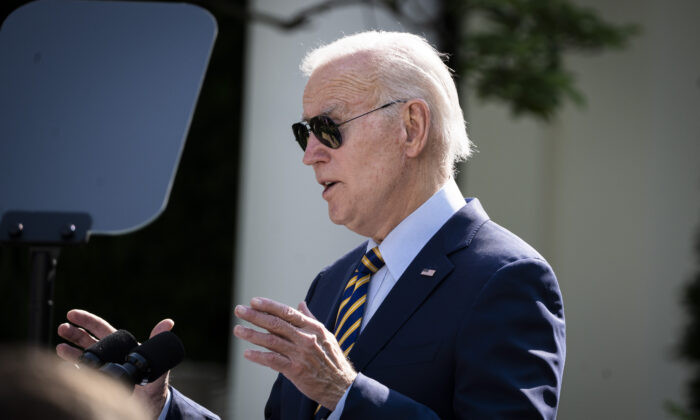
President Joe Biden and House Speaker Kevin McCarthy (R-Calif.) have delegated primary negotiations over raising the debt ceiling and cutting spending to trusted surrogates, establishing a clearer process for resolving the standoff between the parties.
Steve Richetti, counselor to the president, and Shalanda Young, director of the Office of Management and Budget, will negotiate on behalf of the president while Rep. Garret Graves (R-La.) and members of McCarthy’s staff will take the lead for the speaker.
McCarthy announced the process change after an hour-long meeting with the president and other leaders on May 16, the second attempt at negotiations between the two.
“I did think this one was a little more productive. We’re a long way apart. But what changed in this meeting was the president has now selected two people from his administration to directly negotiate with us,” McCarthy said.
Also present were Vice President Kamala Harris, Senate Majority Leader Chuck Schumer (D-N.Y.), Senate Minority Leader Mitch McConnell (R-Ky.), and House Minority Leader Hakeem Jeffries (D-N.Y.).
“They have communicated in these meetings, so we kind of know where everybody stands. It gives us a good feel,” McCarthy said.
“Time is of the essence,” McCarthy added, referring to a possible June 1 deadline for raising the borrowing limit.
Treasury Secretary Janet Yellen notified Congress on Jan. 13 that the country was approaching the debt ceiling. On May 15 she informed Congress that the Treasury would lack the funds to meet all U.S. financial obligations by “early June, and potentially as early as June 1” if the debt ceiling were not increased.
“In my assessment—and that of economists across the board—a U.S. default would generate an economic and financial catastrophe,” Yellen said in remarks to a group of independent community bankers on May 16.


“The U.S. economy hangs in the balance. The livelihoods of millions of Americans do, too. There is no time to waste. Congress should address the debt limit as soon as possible.”
McCarthy lamented the fact that no negotiations had taken place prior to last week.
“Unfortunately, the Democrats wasted four months, saying it had to be a clean debt ceiling or they wouldn’t negotiate. Well, you know what, all that has changed now. And now we’re at a place we should have been back in February,” McCarthy said.
The president and the speaker had been in a standoff over raising the nation’s $31.4 trillion debt ceiling since January. Biden has insisted that it must be raised without condition to preserve the full faith and credit of the United States.
McCarthy has said there will be no increase without an agreement to cut spending. Republicans have proposed lowering discretionary spending to the 2022 level, capping spending growth at 1 percent annually for a decade, clawing back unspent COVID-19 relief funds from the states, and loosening regulations on oil and gas drilling.
The White House has maintained that raising the debt limit is lawmakers’ “constitutional duty.” House Republicans have countered that they did raise the limit by passing the Limit, Save, Grow Act on April 26, though the measure was not taken up by the Senate.
Biden has said he believes a deal is within reach, though no neither side has mentioned specific progress.
“I remain optimistic because I’m a congenital optimist. But I really think there’s a desire on their part, as well as ours, to reach an agreement, and I think we’ll be able to do it,” he told reporters on May 14.
Following the May 16 meeting, McCarthy declined to share that expectant attitude.
When asked if he was now more optimistic about reaching an agreement, the speaker said, “I’m not more optimistic. When you’re only 15 days away and you’re trying to raise the debt ceiling? The only thing that I think is better is now we have a format, a structure it’s something that I requested back in February.”
He added, “I think we have the time to find a solution now.”
Negotiations are complicated by Biden’s plans to travel to Japan on May 17 for the G7 Leaders’ Summit, a trip that was supposed to last eight days and include stops in Australia and New Guinea for meetings with other leaders in that region.
However, the White House announced just after the meeting on the debt ceiling that the president’s trip would be shortened with the visits to Australia and New Guinea postponed.
Earlier in the day, White House Press Secretary Karine Jean-Pierre brushed aside the suggestion that Harris might take over negotiations in the president’s absence.
“The president can be president anywhere. He can do the work of the American people abroad,” Jean-Pierre said.
“She’s been part of this process throughout these conversations about the budget, about not defaulting,” Jean-Pierre added. “That is not going to change.”
Though other leaders have been present for negotiating sessions, it appears clear that any deal must be struck by the president and the speaker.
Schumer and Jeffries have consistently echoed the president’s talking points, that there should be no negotiation over raising the debt ceiling and that the GOP proposal would be harmful to working Americans.
However, though Schumer leads the majority in the Senate, the 51–49 margin is much too slim to pass a clean debt ceiling, which would require 60 votes.
McConnell has pointedly deferred to McCarthy’s lead on the matter, going so far as to say that he would “be glad to sit in at the White House to support Speaker McCarthy” in negotiations with the president.
A third meeting between the principals has not been announced.


![[GOOD PRESS] ON[GOOD PRESS] ON](https://georgemagazine.com/wp-content/uploads/2024/08/16389056566437433941_2048-300x300.jpeg)

Discount Applied Successfully!
Your savings have been added to the cart.